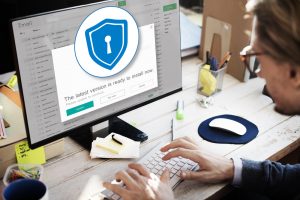As a small business owner, it likely feels as if the day’s work is never done. From accounting to marketing and everything in between, all tasks feel as if they are a priority. However, there is one aspect of your business that you have likely forgotten about: cybersecurity.
Each day, you are handling data. Whether you are accessing password-protected banking information or completing transactions with clients, your day is driven by data. Unfortunately, online criminals know this as well. If you have been the victim of cyberattacks, see that you are not alone. The numbers are staggering:
- Fifty-eight percent of malware attack victims are categorized as small businesses.
- Sixty percent of small businesses say attacks are becoming more severe and more sophisticated.
- In 2017, cyber attacks cost small and medium-sized businesses an average of $2,235,000.
The risks are high. However, there are ways to protect yourself and your clients against data breaches and malware attacks. Read on for five ways to better secure the data you handle every day.
Install a Computer Antivirus System


These tools even periodically scan your computer to ensure that nothing has attached itself to a program. If you want to go a step further in securing your systems, install a firewall program to prevent unauthorized access to your private company network. Together, both will offer a high level of security for your data.
Be Wary of Email Attachments
On average, a small business with less than 250 employees receives nine malicious emails per month. Take a moment to think of the number of emails that crowd your inbox, and it isn’t hard to discover why this happens.
While emails are one of the most substantial problems, attachments are really at the heart of virus spreading. So, be sure to utilize an antivirus system that allows you to scan attachments for malicious intent. One click can spread a virus, so be sure you have a program to handle this.
Encourage Strong Password Creation
All databases or software platforms that contain data should be password protected. However, how does employee password access potentially set a company up for a breach? Many employees are still likely creating passwords that are easy to figure out. Therefore, it is crucial that you encourage them to develop passwords that are unique, complex, and only known to them.
Employees should be warned not to use any part of their name, birth year, hometown, or any information that can be found on social media. They should use passwords that contain numbers as well as symbols. There are password generators out there that can help employees create stronger passwords that cannot be easily found.
Establish Two-Factor Authentication


It means hackers would have to not only know your number or email, but they would also have to know your log-in information for your email address and smartphone. It creates more obstacles for them to go through to hack into your systems.
Establish Proper Employee Cybersecurity Protocol
Are employees taking projects home with them? Are they changing their passwords every 90 days? Do they (and yourself) know how to spot a questionable email that could contain a virus? Knowledge is power in this situation, and you should provide everyone—including yourself— with all the information needed to follow appropriate cybersecurity procedures.
For example, only allow employees to work on company-owned computer or laptops, or notify them that they should not under any circumstances access an attachment unless it is from a trusted source and scanned by malware programs. You should also create a process for employees to notify you or an IT professional if they feel a breach has occurred. The earlier you get a handle on a cybersecurity issue, the better the outcome.
Final Thoughts
Data breaches can happen to even the savviest business owner, and today’s hackers are becoming more sophisticated in their methods of gathering information. Fortunately, there are steps you can take to prevent this from happening to you, but you have to make it a priority.
More than half of small business owners who responded to a small business survey were not allocating any of their budgets to risk mitigation. Any business done online comes with unique risks, and it is crucial to put resources and time in to protect yourself and your clients. Utilizing the steps above could help you create a plan that prevents what would have been a business-ending cyberattack.
The Atlanta Small Business Network, from start-up to success, we are your go-to resource for small business news, information, resources.


While you’re here, don’t forget to subscribe to our email newsletter for all the latest business news know-how from Atlanta Small Business Network.
This has been a JBF Business Media production.






